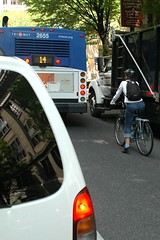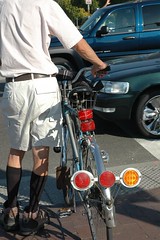
A local TV station recently ran a news segment on the notoriously tricky I-5 bike path. A bicyclist was interviewed. He sometimes has a rough commute, though overall he seemed fit and cheery and enjoyed his choice of transportation.
For some reason, the words “Bikes vs Cars” blared on the corner of the screen throughout the segment.
“Bikes vs Cars:” You hear it everywhere, though, particularly since the Randy Albright case against TriMet became public. One can question whether it’s anything more than a sound byte, but the idea certainly has galvanized media commentators and much of their audience, as we found during the 95.5 fiasco.
It’s partly a natural process of media trying to grasp an emerging subject, and partly a byproduct of the anger and fear felt on the roads every day by motorists and cyclists alike.
The idea that we’re angry, we’re organized, and we’re at war against cars is not entirely ludicrous –in fact, it is in danger of becoming a self-fulfilling prophecy, as media coverage of this “war” (alongside the sheer critical mass caused by the growing number of cyclists on the road and the prominence of organized “bike fun” and other events) causes more and more cyclists to search for resources, information, and community.
Colonial powers have long typecast oppressed populations as savage, lawless, aggressive, and naturally disorderly — a stereotype often internalized or even embraced by colonized people themselves — and thus justified use of genuinely brutal behavior in the name of education and control.
Not to overstate the comparison, but it often seems like nearly everyone—even die-hard cyclists—demands that bicyclists must be held equally accountable, if not fully responsible, for all traffic dangers and carnage. But the real threat to public safety is surely some combination of the over-use, high speed, and unsafe operation of motor vehicles, and the laws, culture, and planning that encourage this to continue. The few examples I’ve heard of actual dangers posed by cyclists are extremely tenuous. The rhetorical tack of blaming cyclists is predictable, but counterproductive.
We’re not at war. Yet. And as of yet, nobody’s at war with us. Quite the opposite — as our numbers grow and we become an expected presence on the road, crashes involving bikes decrease. But as we gain visibility, the threat of polarization looms.
We need to quickly rewrite the “Bikes vs Cars” dichotomy if we’re to avoid our daily commutes becoming like a violent video game of the same name. As cyclists, we will gain peace on the roads (and more fellow-cyclists) much more effectively if we refuse to use—and argue against—divisive language.
In the popular imagination, bikes will always lose against cars because we’re smaller, lighter, and fewer in number. People use the same unsavory vocabulary to talk about car wrecks; in a crash with an SUV, a smaller car always “loses.” Let’s not be losers, ourselves.
We should emphasize unity, and deflect all attempts to categorize cyclists separately. Point out that we’re all pedestrians, even if we’re just walking from our car (or bike) to a store. I like to refer to people rather than machines. “Bicyclists vs motorists” takes the teeth out of any vision of conflict, particularly since so many people are both.



